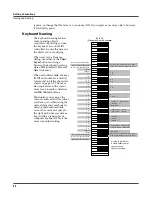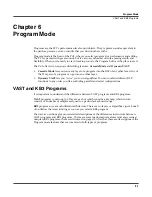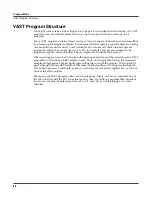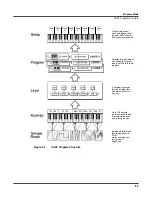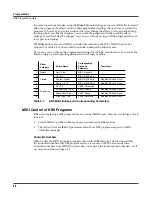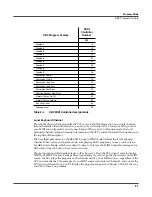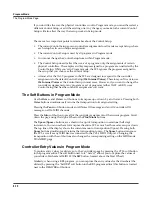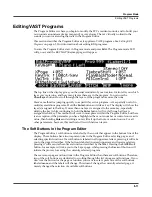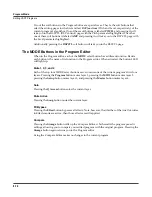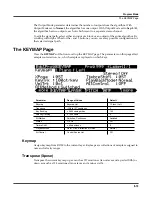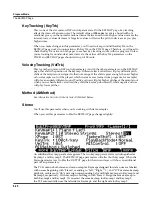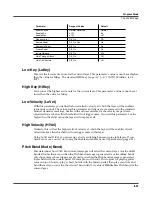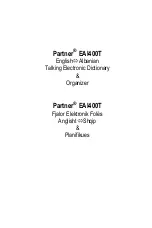
6-8
Program Mode
KB3 Program Structure
You may find it more convenient to use the local keyboard channel. In this case, the PC3 remaps
incoming MIDI to the PC3’s current channel, so in Program mode, you’ll always play the
program on the PC3’s current channel. Incoming MIDI also gets sent to the PC3’s MIDI Out
port. On the other hand, in this case your MIDI source’s transmitting channel must match the
PC3’s local keyboard channel for anything to work. Furthermore, for KB3 programs, some of the
MIDI Controller numbers listed in Table 6-3 won’t necessarily work.
Things are a bit different for playing setups. In this case, you
must
use the local keyboard
channel to be able to play and control all of the setup’s zones. Set LocalKbd to match the channel
your external MIDI source is using (so if, for example, your MIDI source transmits on Channel 1,
set LocalKbd to
1
). All MIDI information that the PC3 receives on the local keyboard channel
gets remapped to the channels and control destinations used by the zones in the setup.
The PC3 also remaps certain MIDI Controller messages that it receives on the local keyboard
channel, so that they correspond (in most cases) to the default assignments for the PC3’s
physical controllers (Mod Wheel, sliders, ribbons, etc.). While this ensures that the physical
controllers work in a consistent and relatively standard fashion for most setups and VAST
programs, it necessitates a few adjustments to make incoming MIDI Controller messages control
the KB3 features listed in Table 6-3. Without these adjustments, some of the KB3 features won’t
respond to MIDI Controller messages—this is true when you’re playing programs as well as
when you’re playing setups.
To make everything work properly, you need to make sure that all the appropriate physical
controllers are assigned for KB3 control. Physical controller assignments are handled by setups,
and are defined by parameters on several pages in the Setup Editor. Each zone of a setup has its
own controller assignments. Programs don’t have controller assignments, so they “borrow”
them from a special setup that’s reserved for that purpose. This setup is called the Control
Setup; it’s determined by the value of the ControlSetup parameter (on the TRANSMIT page in
MIDI mode). You can read about Control Setups in detail on page 6-9.
When you’re playing a setup on the local keyboard channel, each zone that uses a KB3 program
must have the appropriate physical controller assignments. When you’re playing a KB3
program, Zone 1 of the Control Setup must have the appropriate physical controller
assignments.
One final word—for now—about using the local keyboard channel: all the MIDI information
received on the local keyboard channel also gets sent—
after being remapped
—to the PC3’s MIDI
Out port. There’s a discussion of the local keyboard channel in Chapter 10.
Summary of Contents for PC3
Page 24: ...1 6 Introduction Options ...
Page 50: ...4 4 The Operating Modes Using the Modes ...
Page 174: ...7 54 Setup Mode The Utility Soft Buttons ...
Page 178: ...8 4 Quick Access Mode Making Your Own QA Banks ...
Page 204: ...9 26 Effects Mono Algorithms ...
Page 266: ...A 2 MIDI Implementation Chart ...
Page 308: ...Index x ...





